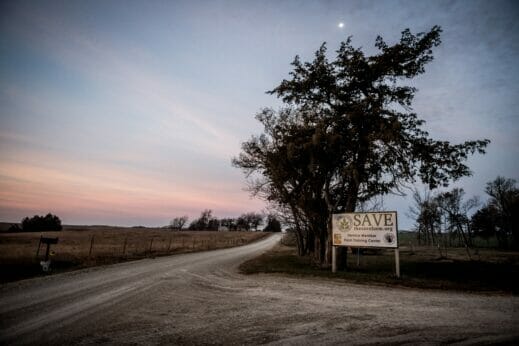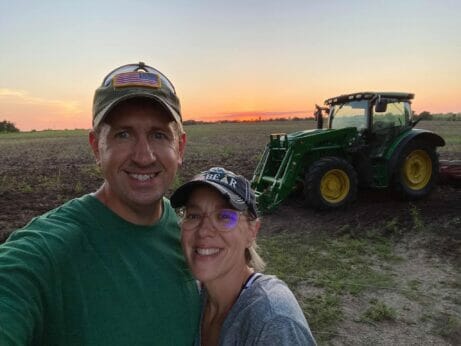This Kansas Farm Gives Veterans A New Path To Civilian Life

[ad_1]
Joe Graham gave 9 years of his life to the warfare in Afghanistan. As soon as he received residence, he was confronted with an amazing activity: discovering a brand new goal and new neighborhood whereas battling signs of PTSD.
“As a soldier, you serve, and also you typically see lots of dangerous issues,” he says. “Coming again into civilian life isn’t straightforward. I struggled for a few years.”
It was on a patch of 308 acres outdoors of Manhattan, Kansas the place life circled for Graham. That’s the place he discovered SAVE Farm. SAVE, which stands for Servicemember Agricultural Vocation Schooling, has existed as a non-profit since 2016 to offer veterans with coaching in sustainable and regenerative farming, paired with assist companies in psychological and bodily well being.

SAVE Farm. Pictures by Alessandra Clark.
SAVE’s program, which is 5 months lengthy, goals to assist veterans of their transition to civilian life and put together them for a profession path in agriculture, in the event that they so select.
“I feel that is interesting to lots of veterans,” says Graham. “It’s peaceable as a result of it’s simply you and the animals and the land. You get your palms soiled, however you place within the work to verify the land can maintain itself.”
Graham, who enrolled in this system together with his spouse Jennifer in 2021, is working to construct a farming enterprise. For the reason that farm’s inception, greater than 50 veterans have graduated from its program. Roughly 75 per cent of its graduates have chosen to pursue a career in farming.
At a time when greater than a 3rd of U.S. farm and ranch operators are over 65 and the speed of suicide for veterans is 1.5 larger than that of the final inhabitants, SAVE Farm founders say the non-profit provides a number of wins.
SAVE is the brainchild of retired colonel Gary LaGrange and his daughter Shari, who noticed outcomes from offering troopers with beekeeping coaching and remedy at close by Fort Riley military set up in north central Kansas. Tod Bunting, SAVE’s CEO and co-founding member, says he’s seen the optimistic transformation that occurs on the farm.
Having additionally served within the navy, Bunting believes there’s a nice want for SAVE’s mannequin to be replicated throughout the nation. “I consider that our veterans are in disaster, as a result of challenges that include service,” he says. “That is necessary work, particularly for these with the deepest wounds, those which will fall by means of the cracks, who want a tighter security web and who must know individuals take care of them.”
Three part-time farm employees and two AmeriCorps employees assist handle SAVE’s operations, the place they’ve goats, sheep, geese, cattle and rabbits. They develop corn, sorghum, soybeans and wheat, in addition to barley, triticale and alfalfa for canopy crops. An orchard at present grows hazelnuts and blackberries. There’s additionally an apiary for beekeeping and a excessive tunnel, which is a instructing station for horticulture.
However Bunting says it’s the partnerships between Kansas State College, the USDA’s NCRS, the Kansas Affiliation of Conservation Districts, The Nature Conservancy and different farmers which have allowed the non-profit to construct a community of individuals to design the curriculum and supply specialised academic classes. Those that enroll in SAVE’s comparative agricultural programming are taught all components of farming, animal science and plant science with sustainability prime of thoughts. Regenerative practices akin to no-till, cowl crops, diversification, grazing for wildlife and managing for pollinators are all built-in into the farm’s packages.
And, consistent with a imaginative and prescient to develop this system and graduate 100 veterans a yr, the group hopes its packages will develop into an accredited college below the G.I. Invoice, that means the federal government would cowl the price of enrollment.
Heidi Mehl, The Nature Conservancy’s director of Kansas Water and Agriculture, would additionally prefer to see the non-profit get that accreditation. Mehl, who has labored with SAVE to design its curriculum and incorporate regenerative practices, says the farm’s work could make a considerable environmental affect.
“We’re hoping for ripples in a pond,” says Mehl. What she means is that, ideally, a graduate incorporates these practices on their farm, after which their neighbor sees that they work and in addition adopts them. Research have proven that farmers and ranchers usually tend to strive one thing completely different on their land in the event that they see their neighbor do it.
These regenerative practices, akin to rotational grazing, cowl crops and promotion of soil well being, are key to constructing resiliency within the land, says Mehl, highlighting a 3rd profit to the farm’s mannequin.
“I understand how necessary farming is to our financial system and to our native communities in Kansas,” she provides. “These regenerative practices are simply one other instrument we are able to use to make sure our communities are sturdy.”

Joe and Jen Graham at SAVE Farm.
That method to environmental stewardship and conservation are one thing that Joe and Jen Graham attempt to honor in their very own farm work. At present, in an “incubation” interval on SAVE Farm, the pair is elevating a flock of 40 chickens—or what they hope is a humble starting of a thriving farm enterprise. By spring, they’re aiming to have tripled their flock, promoting their eggs at native farmers markets. Later, they plan to include some livestock they’ll elevate.
Past being the springboard for the couple’s enterprise, the Grahams say the SAVE Farm and its neighborhood are the explanation the longer term appears vivid.
“This has given my life a way of course, a possibility to heal and discover my new life on this world,” Graham says. “It’s lots of laborious work, nevertheless it’s a superb life.”
[ad_2]



